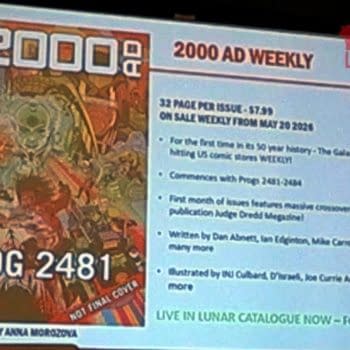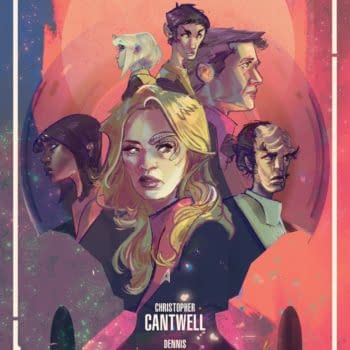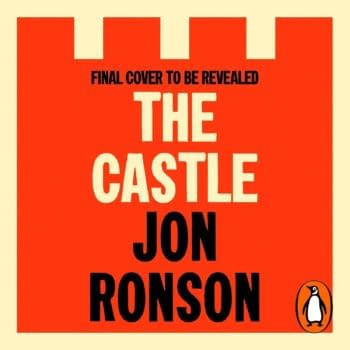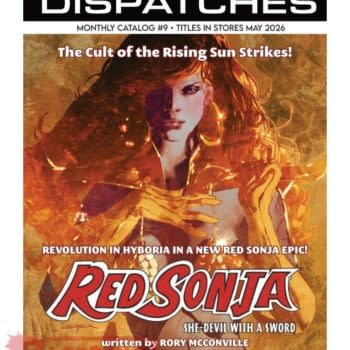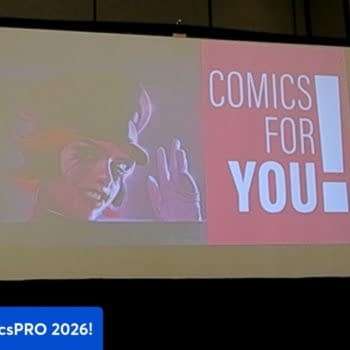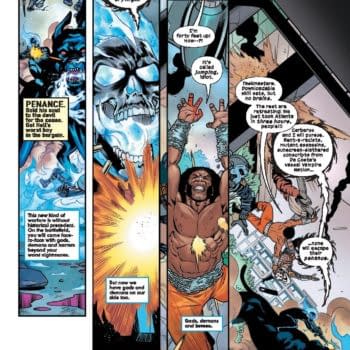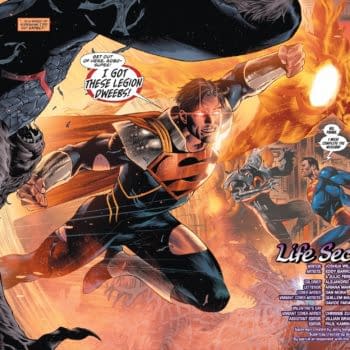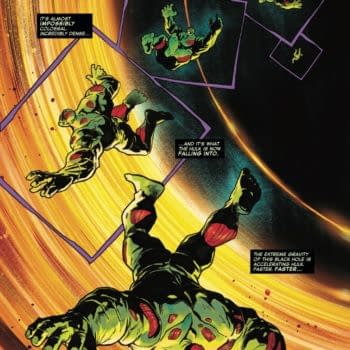Posted in: Comics, Recent Updates | Tagged: avatar press, Comics, entertainment, extinction parade, Harlem Hellfighters, london super comic con, max brooks, world war z, zombies
Max Brooks On Our 'Anxiety-Ridden Decade' of Zombies At London Super Comic Con
At the London Super Comic Con on Saturday Avatar Press hosted a spotlight panel with the author of World War Z, Extinction Parade and the upcoming graphic novel Harlem Hellfighters from Avatar Press: Max Brooks. The packed audience was mesmerised by his showmanship, and Bleeding Cool's Tom Huxley was among them…
Brooks gets the ball rolling by dealing with "the Brad Pitt elephant in the room". He explains how he sold the movie rights to Brad Pitt, with the expectation that he'd produce but not star in it, knowing he was taking a risk – because, in the words of Captain Kirk, "risk is our business", and that's how he feels as a writer. "I took the risk, I let Mr Pitt adapt my book, and then six years later a movie came out with the same title."
But in spite of this dichotomy, Brooks has developed equivocal feelings about the experience. He elaborates how Frank Darabont, fired from the hugely successful Walking Dead TV show after one season, told him that no matter what happens with the movie "you have your book, nobody can take that away from you". And how Darabont had another friend write to him and explain that it didn't matter, the movie would bring more readers to the book than had ever read it before – that friend being Stephen King.
So Brooks sat down to watch the film expecting to "tear his hair out for two hours", with his story "not turning out the way I wrote it", but as the credits rolled, he realised, "wow, they didn't ruin my book. They ignored it!" A liberating feeling that meant he could sit back and enjoy "this wonderful version of 28 Days Later on crack". He describes the film as a "brilliant piece of middle-aged female pornography – forget 50 Shades of getting whipped in chains, if you really want to get a middle-aged married woman hot, her ultimate fantasy is to come downstairs, and there's Brad Pitt making pancakes."
Moving on, he introduces the Extinction Parade – his zombies vs vampires book from Avatar, about "the pitfalls of privilege" – how our greatest strengths as a species come from compensating for our greatest weaknesses. How hardships in the youth of his peers prepared them for adveristy later in life, "whereas the people I grew up with who had everything handed to them, when adversity came knocking, had no survival skills." So he decided to apply that observation to another species "resting comfortably and arrogantly at the top of the food chain", vampires, and explore what would happen when their food source is suddenly grabbed out from under them. How at first the vampires enjoy watching zombies destroy the human civilisation that had grown to suppress them, "thinking it's like the fall of Rome, they think it's a party", until they realise that this is potentially the end of humanity, and that they "have to take a hand in their own destiny".
Brooks then opens up the floor to questions. What does he like about zombies? "Nothing! You wouldn't catch me at a zombie walk – to me, that's like a syphilis walk. They're disgusting." And "not too keen on vampires either".
He's then asked about the importance of the 'Deadliest Warrior: Vampires vs Zombies' episode he contributed to, where he represented the zombie side against Steve Niles on the vampire side. "Zombies lost, and I was okay with that, because I watch Deadliest Warrior and I'm always disappointed that my team always loses." The Extinction Parade short story (which the comic is based on) was about to be published at this time and as he was making the show "there were so many thoughts coming to my head that I hadn't put in the short story it made me think, I should extend this" – so when William Christensen approached him to adapt it he accepted because it gave him a chance to flesh out the ideas that had kept coming to him.
The zombie film that most inspired him is the original Dawn of the Dead, because of George Romero's social commentary on the mindless consumerism of the baby boomers. As far as vampires, there was a range of films, though definitely not Twilight, a series that he thinks "set the suffragette movement back".
What scares Max Brooks? "In real life, 20 years from now visiting my son in rehab and blaming me for everything he did wrong." But in horror, the principle that zombies don't obey the rules of every other monster; that it's trouble that comes looking for you, rather than trouble you go looking for, that terrifies him.
Brooks has been writing since he was about 12, and what inspired him to write the Zombie Survival Guide was Y2K, this "darkness rising" out of the celebratory excess of the 1990s, a fear that apocalypse would arrive from computer clock failure, which was prompting otherwise sensible people to stock up on supplies and read survival guides. So he started reading them "and thought, where's one for me? I'm scared of zombies." So he wrote one for himself, not even with the intent of being published, and without the constraint of writing for an audience he was able to write towards his own interests, which were the little details – such as how most people in a zombie outbreak would die from dehydration and malnutrition before a zombie could ever reach them, the sorts of things that wouldn't fly in a TV show.
A former Houston, Texas resident who had to get rid of all his guns when he moved to London is struggling to work out how he would survive the zombie apocalypse without them. "The truth is, you don't really need guns. I think guns actually make people overconfident. You don't want to get into a confrontation with zombies; you're going to run out of ammo." With a little gentle ribbing at Texan stereotypes, he turns to the rest of the audience saying "you're lucky living in England, because people will actually queue up for the apocalypse."
Why are zombies popular lately? "We've been living in a very anxiety-ridden decade. I think people want to explore the apocalypse, but if it's too real, they want to turn it off." If you make the catalyst into something non-existent, he says, you can explore what the real apocalypse might be like in a way that doesn't go too far in scaring the audience; they want to be scared because they feel "safe" in this "boring world".
World War Z the novel works on a very episodic level – any chance of a TV series? Brooks doesn't know as he's "not involved in any of that stuff", but that there's talk of an Extinction Parade TV series in the medium-term future.
If the apocalypse actually came, who would he take with him? "I'm 42, I'm married with a kid. I have no choices. I can't choose my group. When the zombie apocalypse comes I've got my group pre-prepared. There's me, my wife, my kid, and my Miniature Dachshund, and my Bichon Poodle Mix, and my dad, and Carl Reiner. If there's any room, maybe Mr T, but that's it."
His choice of weapon? "It'd have to be home-grown." And it would need to have multiple uses beyond just being a weapon. Given he lives in LA, it would be a crowbar, something they have to keep in earthquake kits for when doors get jammed in door frames. "As far as other weapons you'd have to consider, talk to the Texan."
Any non-horror material in the works? Brooks recounts how he wrote a screenplay fifteen years ago that was never picked up, called the Harlem Hellfighters, which was based on the true story of "a group of black American soldiers who were set up to fail by their own government" . And how despite the disproportionate hardships forced upon them by their American generals, "when the French put them in combat they became one of the most decorated troops in the entire US army". After sitting in a drawer for over a decade LeVar Burton (of Star Trek fame) persuaded him that it was a good script and a story that needed to be told, so he brought it with him when he came into comics. The graphic novel is coming out April the 1st, and the week before the con Brooks was informed that Will Smith wants the movie rights. But he's not abandoning the horror genre, with about ten issues of Extinction Parade still to go.
How are you going to stop Will Smith from spoiling your script, asks a plucky teenager. Brooks says he doesn't have to worry because it's not his – "it's theirs". It's based on a true story so "the limitations are much more rigid".
Following up on the "pitfalls of privilege", Brooks thinks the term "affluenza" a useful one as he sees the way kids being raised today as being really dangerous, where they're "never allowed to fail any more" for the sake of preserving their self-esteem. He hates the message of TV shows like the Kardashians, "where the message is, the more successful you are, the less work you have to do". That American power was grown by the "greatest generation" which came straight out of the Great Depression, and there is no such hardship for Americans to grow out of today. "You have to grow through struggle, because if you don't, you're just not going to be ready."
And in terms of his own privilege, growing up as the son of the entertainer Mel Brooks and the actress Anne Bancroft, "on paper I had it pretty good," but he had dyslexia "and all the money in the world couldn't make me read better, couldn't buy me doing less homework. I was tutored every night from first to eleventh grade, for two to four hours, just to get me a passing grade" while he'd see the rest of his peers coast through school sometimes without doing any work at all. That hardship prepared him for his career, and the reason that his works are so heavily researched is that "I'm comfortable with sitting down and opening a damned book and taking notes" for hours on end because it's what he did his entire childhood. "Details mean everything to me now, it made me who I am."
Meanwhile the people who he saw having it easy at school he's seen find adult life a lot harder to cope with. He is frustrated by the young Americans he hears about who "can't take criticism, they just call their parents". It doesn't matter who you are "nobody's immune, so you'd better prepare for it".
And finally, Max Brooks is asked if he's made any mistakes in his adult life. Explaining that the term "epic fail" was invented with him in mind, "perceived privilege" has never stopped him from getting fired, from getting his work rejected by his superiors. "I wrote things that nobody wanted to publish, to this day he (pointing at Avatar's William Christensen) won't publish some of my stuff! And I make him money! This happy, smug, Peter Griffin-looking mother– anyway…" He described a book he'd written after World War Z that generated an email from his British publisher which said, "Max, why would you even write this?" The truth is, Max Brooks has made "a galaxy of mistakes, and I regret none of them, and I regret none of the mistakes I will continue to make".
You can hear the whole video below. Bleeding Cool is owned by Avatar Press.
[youtube]https://www.youtube.com/watch?v=dpMALM4-VCQ[/youtube]







